Auckland Travel Guide
Situated on a narrow strip of land and flanked by two magnificent harbours to the east and west, Auckland is a magical destination of stunning locations and easy-going locals. The shallow Manukau Harbour opens out to the Tasman Sea to the west, while the Waitemata Harbour lies at the heart of the city centre and is Auckland's deepwater port. It has a vibrant waterfront that has flourished with the successful hosting of the America's Cup, and the trendy restaurants and waterside cafes are a constant hive of activity.
Known as the 'City of Sails', with a larger boat-to-person ratio than anywhere else on earth, it is a paradise for sailing enthusiasts. Every weekend the waters of the Hauraki Gulf come alive with a flotilla of colourful sails. The best way to experience the city is from the water, sailing around the attractive harbour or on a ferry cruise to one of the many stunning islands dotted about the Gulf.
Auckland is the largest and most cosmopolitan city in New Zealand, and acts as a major gateway to the rest of the country. Yet it's also one of the least densely populated in the world, covering an area twice the size of London but with barely a million inhabitants. It has a friendly small-town atmosphere and a relaxed pace of life.
Beyond the bustling downtown area, dominated by the southern hemisphere's tallest building, the Sky Tower, the city sprawls outwards, with low-slung buildings and wooden houses among leafy parks and walking tracks. The suburbs wind their way around picturesque bays and harbours and between volcanic hills that provide panoramic views over the city and mountains, encompassing numerous green urban parklands that are dotted with sheep.
Things to do in Auckland
As the largest and most cosmopolitan city in New Zealand, Auckland has plenty on offer for visitors, with sights ranging from scenic cityscapes to beautiful wildlife reserves that surround the destination. If visitors are heading out with the kids or just want to learn more about Auckland, Maori culture, or New Zealand in general, a great place to start would be the Auckland Museum. The museum overlooks the city and the attractive Waitemata Harbour and is one of the most visited attractions in Auckland. Apart from the museum there's also the Auckland Art Gallery, which houses some amazingly creative installations and has free tours that start daily around midday.
After soaking up some local knowledge and culture, travellers can take a daring venture up the Auckland Sky Tower, one of the tallest freestanding buildings in the Southern Hemisphere, from which there's a breathtaking 360-degree view of the city, the harbour and the gulf islands. Other attractions include catching a show at the Civic Theatre, or enjoying a lazy walk through Albert Park. A popular way to enjoy many of these sites is to purchase a tourist card, called an Auckland City Pass, which allows access to numerous venues within a one-month period.
For those keen to explore the wilder side of Auckland, there's a ferry from Auckland Harbour to Tiritiri Matangi Island, one of New Zealand's most important wildlife sanctuaries. Visitors can admire the beautiful flora and fauna of Auckland while on a tour led by expert guides of the island.
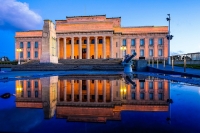
Auckland Museum
The Auckland Museum overlooks the city and the attractive Waitemata Harbour. It's one of the most visited attractions in the city, housing a remarkable collection of Maori and Pacific Island artefacts and cultural displays. Originally built as a World War I Memorial in 1929, the building was dedicated to the memory of New Zealand victims in both World War I and II. The 'New Zealand at War' exhibition has since been joined by extensive displays about the people and the country, its cultures, art and natural history. A highlight is the Maori cultural performance of song and dance, performed three times daily.
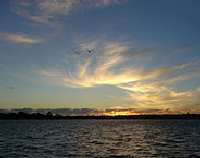
Hauraki Gulf Islands
The Hauraki Gulf is studded with numerous islands, some recreation retreats and others conservation islands with restricted access for the protection of rare bird, animal and plant life. Waiheke is the most popular, and has picturesque bays and white sandy beaches, rolling farmlands, and hills cloaked with vineyards and fine wineries. Uninhabited Rangitoto is a large volcanic cone with an unusual landscape of black distorted lava shapes. It's possible to hike up to the crater rim and explore the lava caves on the slopes. Each island has its own distinct character, so tourists can decide if they want to explore natural geographic features, relax on the beach, or simply wander around galleries and cafes.
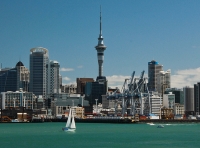
Auckland Sky Tower
At 1,076 feet (328m), Auckland's Sky Tower is the tallest freestanding structure in the Southern Hemisphere and has unforgettable views over the city, the harbour and the gulf islands. It's part of the Sky City Entertainment Complex, which has a casino, theatre, hotel and conference centre. Visitors can splash out on dinner in the revolving restaurant, or admire the view from one of the four circular observation decks, which are reached by a glass lift. The tower has an outdoor deck, glass floor panels, an audio visual guide, and a number of touch computer screens providing geographical information. The Sky Deck is the highest viewing level and has spectacular 360-degree views.
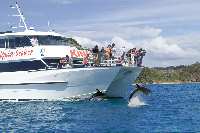
Bay of Islands
The Bay of Islands is famous for its beautiful coastal scenery. Interspersed with numerous little coves, inlets and sandy beaches, the historical townships of Paihia, Waitangi and Russell are the central hubs of the area. Sailing and boat cruises around the islands are the main attraction, but the natural surroundings and warm waters of the bay make it an ideal place for kayaking, swimming, diving, and fishing. The bay is also of historical significance as the place where the Treaty of Waitangi was first signed between the European settlers and Maori chiefs in 1840.
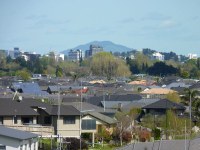
Hamilton
Hamilton is a pretty town 80 miles (128km) south of Auckland. Its proximity to the bigger city means it's often overlooked by tourists in New Zealand. However, as an excursion from Auckland, Hamilton has some worthwhile sights to offer. There are several hot springs around Hamilton, and the city is full of gardens, parks and river walks. Not far out of Hamilton is Matamata, home to the Hobbiton Movie Set, which is the 'Hobbit village' that was created for The Lord of the Rings film trilogy. Guided 'film and farm' tours are offered for fans of the movies.
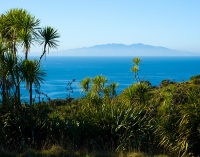
Tiritiri Matangi Island
Tiritiri Matangi Island is a wildlife sanctuary and one of New Zealand's most important and exciting conservation projects. A hundred and twenty years of farming had seen this 220-hectare island stripped of almost all its native bush but between 1984 and 1994, volunteers planted between 250,000 and 300,000 trees. The Island is now sixty percent forested with the remaining forty percent left as grassland for species preferring open habitat. Visitors can access the island by a regular ferry service, which leaves from Auckland and Gulf Harbour. When on the island, visitors can enjoy a guided walk, explore the beaches or simply admire the natural beauty of the place.
Eating Out
Auckland has a diverse and full-flavoured variety of eating establishments. From Indian to Japanese, and Turkish to French, there's a veritable rainbow of cuisine available from which visitors can choose.
Fuelled by entrepreneurial immigrants and New Zealand's strong focus on artisanal food, wine, and beer, the bustling local markets of the country's biggest city are excellent shortcuts to understanding Auckland's cultural mosaic. With well-established farmers' markets complemented by newer specialist markets, Auckland emerges as New Zealand's only truly international city and it's certainly reflected in the variety of its restaurants.
Although Auckland's food scene is a melting pot of national cuisines, locals still love their traditional New Zealand cuisine. Staples, such as roast lamb are a favourite, along with all kinds of fresh seafood, including of course, the famous New Zealand mussel. Auckland has no shortage of brilliant restaurants serving this type of local cuisine, with establishments such as One Tree Grill creating inspired Pacific Rim style dishes for patrons to enjoy, which can be deliciously paired with a wide selection of New Zealand's world famous wines.
There are many areas in Auckland to enjoy a bite to eat, but if travellers want an authentic seafood experience, they should cruise around the Viaducts and Waterfront, where they can find a variety of fresh seafood treats to choose from. Other popular clusters of eateries can be found in High Street, Queen Street, the Wynyard Quarter, and the Arts Precinct, each of which has a unique atmosphere and speciality restaurants.
Nightlife
Auckland's 'city of sails' reputation and natural beauty make it an ideal destination for tourists wishing to take part in sightseeing. However, Auckland comes alive at night with clubs, bars, cinemas and pubs, and is arguably the kiwi nightlife capital. The city has a great selection of clubs and bars catering for up and coming businessmen, highflyers and young students. The main nightlife areas include High Street, Ponsonby, Viaduct Harbour, Parnell, and Karangahape Street. There's a great mix of bars, clubs, and quirky establishments in Auckland from which visitors can choose, including a great live music scene.
Getting Around
Auckland has a fairly comprehensive public transport network, including buses, trains, and ferries. The Link bus offers three bus loop routes in downtown Auckland that pass many of the major tourist attractions and are useful for travellers; the routes are colour-coded and buses pass frequently.
The city train service is aimed primarily at commuters and is of limited use to tourists. Ferries connect to the north shore suburbs and take passengers to the Hauraki Gulf Islands. Taxis can be hailed on the street, but are more commonly booked by phone; Uber is also an option. Despite all this, many visitors find getting around Auckland frustratingly slow without a car, and for many hiring their own vehicle is still the most convenient option, especially if they're planning to explore beyond the city.
Auckland Climate and Weather
Auckland has an oceanic climate, with warm, humid summers and mild, damp winters. The city experiences plenty of rain throughout the year, but predominantly in winter; the summer months are the driest. In summer, between December and February, temperatures average between 57°F (14°C) and 74°F (23°C); and in winter, between June and August, temperatures average between 44°F (7°C) and 59°F (15°C). The weather can be very changeable in Auckland year-round, with tropical cyclones and cold fronts causing occasional extreme conditions such as hailstorms.
New Zealand travel info
Electricity
The electrical current is 230 volts, 50Hz. Oblique flat blade plugs are standard.
Language
The official languages in New Zealand are English, Maori and New Zealand Sign Language.
Money
The local currency is the New Zealand dollar (NZD), which is divided into 100 cents. Most businesses accept MasterCard and Visa and, while Diners Club and American Express are also widely accepted in the main tourist centres, they might have limited acceptance elsewhere. ATMs can be found in all towns and cities.
Tipping
Gratuities are not expected in New Zealand, but it's acceptable for guests to tip at their discretion.
Health
There are no health risks associated with travel to New Zealand. New Zealand's Accident Compensation Commission (ACC) covers emergency treatment for visitors, but health insurance is recommended to cover any additional charges and for those not entitled to free emergency treatment. Those intending to participate in adventure activities, such as bungee jumping, white water rafting should ensure that their travel insurance covers these types of activities.
Safety
New Zealand has a reputation as one of the safest destinations in the world, but sensible precautions against petty theft are still advised. Among them, travellers should avoid leaving possessions in unattended vehicles, even if they're out of sight, and they should use the hotel safe if possible.
Travellers who plan on swimming in coastal waters should be aware that riptides are common and can be dangerous, and that several drownings are reported every year. Sharks, seals and other wildlife present a risk to swimmers in certain areas. Travellers should avoid unsupervised beaches and at all times follow the instructions and warnings of lifeguards.
Adventure tourism, which includes zip-lining, rock climbing or trekking, can be dangerous, especially if activities are not well-organised. Enthusiasts should educate themselves on best practices for safety, and arrange activities through a tour operator that meets international standards.
Local customs
Though New Zealand has a strong reputation for tolerance towards homosexuality, there are still isolated incidents of homophobic related crime. LGBT travellers should be aware of local sensitivities, especially when visiting rural areas. Importing illegal drugs is punishable by up to 12 years' imprisonment.
Doing business
New Zealand is ranked first in the World Bank's Ease of Doing Business rankings. The business culture of New Zealand conforms to a typically British model: formal, reserved and conservative. However, this is tempered with a characteristically Antipodean warmth and friendliness, creating a relaxed, yet professional atmosphere.
Business etiquette in New Zealand will be familiar to those who've worked in western corporate environments before. Foreigners should use titles until instructed not to do so, and maintain eye contact when speaking to their associates. Business meetings should be scheduled at least a week in advance, and then confirmed a few days before they are due to take place. The dress code for business in New Zealand is usually formal. For meetings, men should stick to a dark suit, worn with a tie; women should wear a smart dress, business suit or pants suit, and limited accessories.
The official language of business in New Zealand is English, and business hours are generally from 8.30am (or 9am) to 5pm, Monday to Friday; and 9am to 12.30pm on Saturdays.
Duty free
Travellers to New Zealand over 18 years do not have to pay duty on 50 cigarettes, or 50g of cigars or tobacco, or a mixture of all three not exceeding 50g; three bottles of spirits or liqueur each containing not more than 1,125ml; 4.5 litres of wine or beer; and other goods to the value of NZD 700. Goods exceeding the allowances must be declared. Personal effects not dutiable include items such as jewellery, binoculars, portable radios, prams, camping equipment, cameras and video cameras. Prohibited items include concealed firearms, foodstuffs, animals, plants and plant products. It is forbidden to export Greenstone, Maori antiquities and Paua shells (unless they are products manufactured from such shells). Prescription medications need to be accompanied by a doctor's letter and the original prescription, they should not amount to more than three months worth of the medication.
Communications
The international access code for New Zealand is +64. The outgoing code is 00 followed by the relevant country code (e.g. 0061 for Australia). A good option is to purchase a local prepaid SIM card at the airport on arrival. Alternatively travellers use eSIMs if their cellular providers support it on their networks. WiFi access is widely available in hotels, restaurants and other tourist establishments, except in some of the more remote areas.
Passport & Visa
All foreign passengers to New Zealand must hold return or onward tickets, the necessary travel documentation for their next destination, and proof of sufficient funds to cover their expenses while in the country (usually NZD 1,000 per month, or NZD 400 if accommodation has been prepaid). All visitors must obtain a permit to enter Tokelau from the Tokelau Apia Liaison Office in Apia, at least two weeks prior to travel. It's highly recommended that travellers' passports have at least six months' validity remaining after the intended date of departure from their travel destination. Immigration officials often apply different rules to those stated by travel agents and official sources.
Entry requirements
US citizens must have a passport that is valid for at least three months beyond the date of departure from New Zealand. No visa is required for stays of up to three months. Travellers must have a New Zealand Electronic Travel Authority (NZeTA) obtained prior to boarding.
UK citizens must have a passport that is valid for at least three months beyond their date of departure from New Zealand. No visa is required for stays of up to six months. Travellers must have a New Zealand Electronic Travel Authority (NZeTA) obtained prior to boarding.
Canadian citizens must have a passport that is valid for at least three months beyond the date of departure from New Zealand. No visa is required for stays of up to three months. Canadians must have a New Zealand Electronic Travel Authority (NZeTA) obtained prior to boarding.
Australian citizens must have a passport that is valid upon their arrival in New Zealand. No visa is required.
South African citizens must have a passport that is valid for at least three months beyond the period of intended stay in New Zealand. South Africans require a visitor visa that must be organised prior to travel.
Irish citizens must have a passport that is valid for at least three months beyond the period of intended stay in New Zealand. No visa is required for stays of up to three months. They must have a New Zealand Electronic Travel Authority (NZeTA) obtained prior to boarding.
Useful contacts
Tourism New Zealand, Wellington:+64 4 462 8000 or www.tourismnewzealand.com
111 (All Emergencies)Embassies / consulates in other countries
New Zealand Embassy, Washington DC, United States: +1 202 328 4800.
New Zealand High Commission, London, United Kingdom (also responsible for Ireland): +44 20 7930 8422.
New Zealand High Commission, Ottawa, Canada: +1 613 238 5991.
New Zealand High Commission, Canberra, Australia: +61 2 6270 4211.
New Zealand High Commission, Pretoria, South Africa: +27 12 435 9000.
Embassies / consulates in New Zealand
United States Embassy, Wellington: +64 4 462 6000.
British High Commission, Wellington: +64 4 924 2888.
Canadian High Commission, Wellington: +64 4 473 9577.
Australian High Commission, Wellington: +64 4 473 6411.
Honorary Consulate of South Africa, Wellington: +64 4 815 8484.
Honorary Consul General of Ireland, Auckland: +64 9 919 7450.



